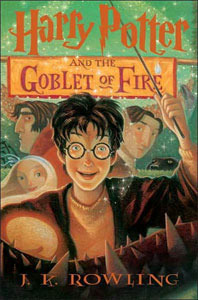There's a Hole in My Potter…
 I've been reading the Harry Potter books to my daughter, Miss M. We're now obsessed, and spend most of our days roleplaying the characters. She's Hermione. Our latest party game is coming up with alternate anagrams for "Tom Marvolo Riddle" that would make him less intimidating than "I Am Lord Voldemort." We like "Dove Mold" to start with, but haven't found a great way to use the rest of the letters. Alternatively, we call him "Tommy," which also takes away his fear factor quite a bit.
I've been reading the Harry Potter books to my daughter, Miss M. We're now obsessed, and spend most of our days roleplaying the characters. She's Hermione. Our latest party game is coming up with alternate anagrams for "Tom Marvolo Riddle" that would make him less intimidating than "I Am Lord Voldemort." We like "Dove Mold" to start with, but haven't found a great way to use the rest of the letters. Alternatively, we call him "Tommy," which also takes away his fear factor quite a bit.
That's all off-track though. I'm here to talk about holes. I'm in a place where I'm working on the outline for Book #2. It's not a Populazzi sequel, it's a new series with a new mythology, and a lot of the legwork in the planning stage is filling in holes. This is vitally important in this skeleton stage, because if there's a hole in a novel's infrastructure, it'll only get bigger as the story builds out from it.
Case in point, Harry Potter and the Goblet of Fire.
SPOILER ALERT — STOP READING HERE IF YOU'VE NEVER READ HARRY POTTER AND THE GOBLET OF FIRE. Feel free to swing by the comments and we can chat Voldemort anagrams. But if you have read the book, by all means carry on…
In Harry Potter and the Goblet of Fire, students can't enter the Triwizard Tournament unless they're 17. It's a major rule. Dumbledore even puts a spell around the Goblet of Fire, so it rejects anyone underage trying to enter. Those who use anti-aging spells to get around the rule are shot back from the Goblet wearing a beard — their Scarlet A for trying to sneak one by Dumbledore.
And yet, when Harry's name is pulled from the Goblet, and Harry says he never entered, Dumbledore asks if Harry had anyone else — someone of age — put in his name.
What?!
Dumbledore, the greatest wizard who ever lived, wants to make sure no one underage can enter the Tournament, goes so far as to account for aging spells, but neglects to make sure an older student couldn't slip in a younger one's name? The Goblet of Fire can be outsmarted by the same tactic young muggles have been using to buy beer for nearly a century?
I don't buy it. Everything we know about Dumbledore tells us he's waaaaaay smarter than this. Yet there it is, and the story builds out from there, all of it resting on the fact that someone else of-age could put Harry's name into the Goblet of Fire.
A hole like this could kill a lesser book, but this is Harry Potter, so it's part of a great story with rich characters and a mythological world of such texture that I'm willing to make the buy so I can stay on the ride.
But I think about it. And it bothers me. And if I weren't in the company of all the people I know and love at Hogwarts, I might put down the book.
A huge part of creating a great story is avoiding holes. It's something we need to do every step along the way, but at no point is it more important than when we're building the underlying plot structure. If that's flawed, no amount of clever dialogue or interesting characters will stop readers from stepping out of the story's reality and shaking their heads with a frustrated, "But that doesn't make sense!"
So that's where I am right now in the process — Hole-Filling Duty. It's an exciting place, because filling in the holes requires me to think more deeply about my world, and understand it better.
So… let's talk holes! Are there holes in books you love? Holes you forgive because you're enjoying the ride so much you're willing to shrug them off? Have you found holes in books that turned you off to the point you had to put them down? Have you ever gotten several drafts along in your own work, then noticed a hole that threatened to destroy everything?
Can't wait to hear your thoughts! (And your anagrams, if you jumped down to the end.)



